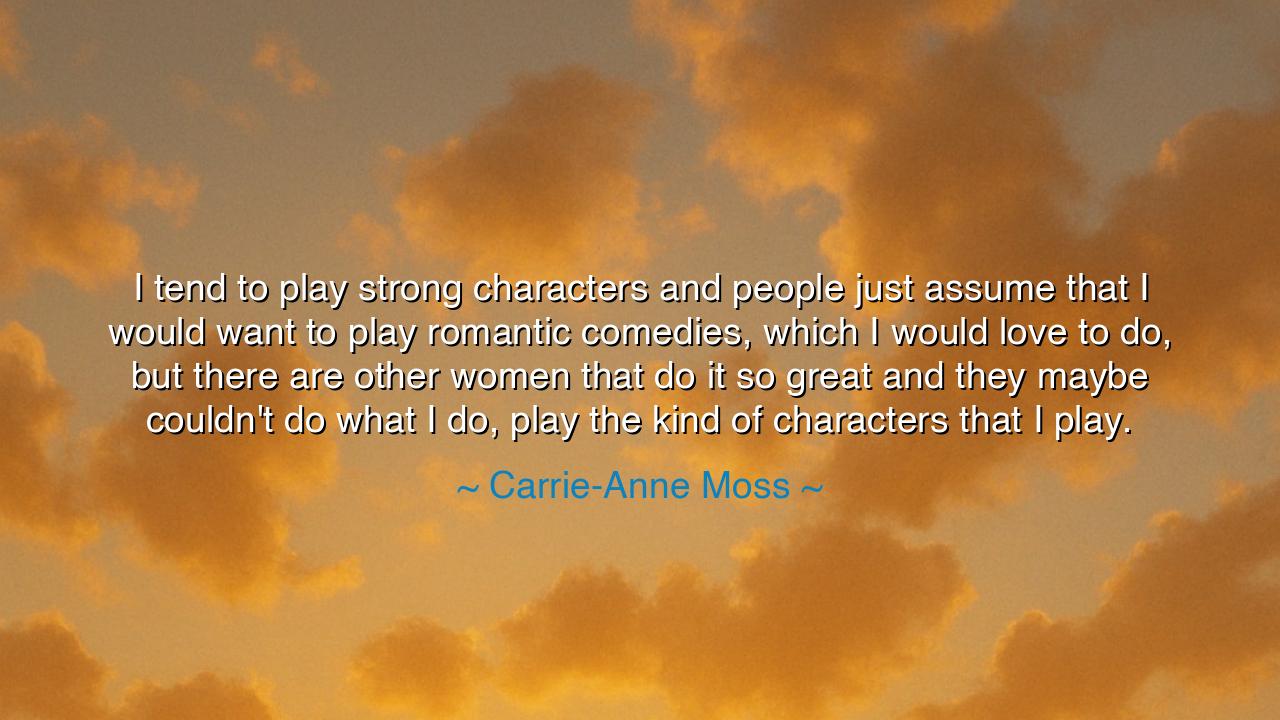
I tend to play strong characters and people just assume that I
I tend to play strong characters and people just assume that I would want to play romantic comedies, which I would love to do, but there are other women that do it so great and they maybe couldn't do what I do, play the kind of characters that I play.






"I tend to play strong characters and people just assume that I would want to play romantic comedies, which I would love to do, but there are other women that do it so great and they maybe couldn't do what I do, play the kind of characters that I play." – Carrie-Anne Moss. These words carry within them the wisdom of a soul that understands the diversity and complexity of identity. Moss speaks not only of the roles she plays on the screen but of a deeper truth about self-expression, strength, and the choices we make in life. It is a recognition that each individual—be they actor or not—has a unique way of showing up in the world, a way that is shaped by their inner strengths, passions, and talents, and that these qualities should not be confined to simplistic expectations.
In the ancient world, there was a recognition that virtue and strength could be expressed in many forms. Take, for example, the Greek hero Achilles. He was a figure of immense power and skill, yet his strength was not solely defined by his physical prowess. It was his character, his choices, and his response to fate that made him legendary. Similarly, in life, there are those whose strengths are not so easily defined, not by a single role or expectation, but by their ability to adapt, to embody different aspects of the human experience. Moss’s recognition of her own strength—her ability to play intense, complex characters—is an acknowledgment of the multiplicity of roles a person can occupy, both on screen and in life.
Consider the ancient philosopher Socrates, who believed in the self-examination of one’s life. He taught that true wisdom lies in understanding one’s own capabilities and limitations, and living in accordance with that understanding. Moss’s statement mirrors this ancient wisdom—she understands what she is capable of and acknowledges the greatness in others who can excel in areas that she may not be naturally drawn to. In doing so, she embraces the full spectrum of what it means to be human, recognizing that our strengths do not need to compete, but can complement one another.
There is also a strong resonance here with the myth of Athena, the Greek goddess of wisdom, courage, and strategy. Athena, unlike the other gods, was not defined by romance or beauty but by her intellect and strength of character. She was a goddess who could outwit any opponent, outmaneuver any enemy, and who stood as a symbol of a different form of empowerment—one that was cerebral and strategic. Much like Athena, Moss embodies a form of strength that is often overlooked or undervalued in the traditional world of entertainment. She is drawn to roles that require deep intellectual engagement and physical resilience, roles that challenge her, rather than those that conform to typical romantic ideals.
The key lesson in Moss’s words is one of acceptance and respect for one’s unique path. She does not feel the need to conform to societal expectations about what roles a woman should or should not play. Rather, she embraces her strengths and acknowledges the power of other women in different arenas. This recognition teaches us that we should not be bound by expectations of what we "should" do based on our gender, appearance, or abilities. Rather, we should have the courage to explore the many facets of who we are, to celebrate what makes us different, and to carve out a unique space for ourselves.
In our own lives, we too must recognize that we are not defined by a singular role or identity. Like Moss, we must embrace the strengths that come naturally to us, while also appreciating the talents and contributions of others. To truly flourish, we must cultivate our abilities in a way that is authentic to our inner selves, and allow others to do the same without judgment. In relationships, in work, and in life, the diversity of human experience is what makes the world richer. It is through embracing the fullness of our potential—rather than succumbing to the pressure of predefined roles—that we will find the greatest fulfillment.
Let us, then, follow Moss’s example and seek out the strengths within ourselves, not as a comparison to others, but as a celebration of our unique contributions. In so doing, we will not only fulfill our own potential but will also build a world that honors the diverse ways in which each individual can shine. In our pursuits, whether creative, professional, or personal, may we remember that our strength does not lie in conforming, but in embracing our own distinctive abilities, and recognizing the beauty and strength in others. Through this, we create a more harmonious and empowered world for all.






AAdministratorAdministrator
Welcome, honored guests. Please leave a comment, we will respond soon